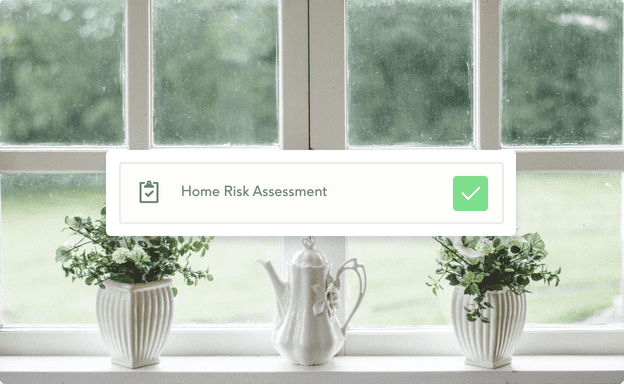Dementia care at home

A dementia diagnosis does not mean the end of an active, happy and fulfilled life.
It’s normal to be worried when someone you love gets diagnosed with dementia. The fear of the unknown can be unsettling. Despite this, it’s vital to remain positive. Thanks to ongoing research, live-in care techniques and assistive technology, it is possible to live well with dementia, and remain at home.
At Edyn we know first hand the power of having familiar surroundings. We hope, therefore, to lighten the burden and help you through the experience by sharing some useful information that will enable you to ‘invite’ dementia into the home, rather than it kicking you out.
What is dementia?
Dementia is a syndrome that occurs when the brain is damaged by diseases.



Dementia can affect anyone, whatever their gender, ethnic group, class, education and there is no cure, although research is going on.
There are an estimated 100 types of Dementia. When your loved one is diagnosed with dementia, the diagnosing clinician should be able to tell your loved one what type they have. This is useful to know since symptoms and patterns of progression vary from one to another, and it may help you and your loved one feel more prepared for what the future holds.
Some prominent forms of dementia
Alzheimer’s disease
- Is the main form of dementia, accounting for around 60% - 80% of all dementia diagnosis in the UK.
- Usually affects a part of the brain called the hippocampus which relates to memory and emotion.
- The first sign of Alzheimer's disease is usually problems with memory, such as forgetting a conversation or the names of places or people.
- As the symptoms of Alzheimer’s disease often progress slowly it is commonly diagnosed fairly late due to symptoms of old age overlapping.
Vascular dementia
- Second most common type of dementia, affecting around 150,000 people in the UK.
- Most researched forms of dementia are usually caused by strokes or mini-strokes.
- Around 20% of people who have a stroke develop vascular dementia.
- Symptoms may be similar to those of Alzheimer’s though can also include visual problems, bladder control and paralysis.
Dementia with lewy bodies
- Is often mistaken for Alzheimer’s and shares symptoms with this and Parkinson’s.
- It is less understood and more complex, accounting for around 10%-15% of those with dementia.
- Lewy bodies are abnormal clumps of protein building up in the brain.
- Sleep disturbances, problems with movement, swallowing, tremors and hallucinations are among the main symptoms.
Frontotemporal dementia
- Rare group of dementia conditions which are commonly diagnosed at a younger age.
- It’s name derives from the effects it has on the brain’s frontal lobe which influences our behaviour and moral judgements.
- It has three main types: picks, progressive non-fluent aphasia and semantic dementia.
- Behaviour and speech issues are the usual symptoms.
Symptoms
There are many different types of dementia, the most common being Alzheimer’s disease. It is progressive, meaning that symptoms will eventually get worse. It starts as ‘mild cognitive impairment’ (MCI): forgetfulness or ‘senior moments”. But as it progresses the symptoms vary depending on the type.
Each type of dementia may affect different parts of the brain and thus result in different symptoms, though the early symptoms of dementia may be mild or increase fairly rapidly depending on a person of type. Many tend to think of dementia as mainly memory loss, but there is quite often a range of early symptoms which can be key indicators.
Memory loss:
Such as struggling to recall a familiar face or name
Confusion:
Such as misplacing personal items, like glasses and medication
Linguistic problems:
Such as pauses in sentences and difficulty finding words
Increase movement:
An uptick in movement around the house
Changes in mood and behaviour:
Such as a loss of interest in hobbies
Dementia facts and stats
850,000
people in the UK living with dementia
Dementia attracts
7.4%
of the research funding that goes into cancer
A person is diagnosed with dementia every
three minutes
Over 100
different types of dementia
70%
of people in care homes have dementia
Disproportionately
affects women
Dementia live-in care
We understand that with patience, trust and genuine care, we can help those diagnosed with dementia maintain a high quality of life and live comfortably in their own home.
Ensuring your home is dementia friendly

Ensuring your home is dementia friendly
When considering live-in care it’s important to ensure that the home of the care recipient is safe and secure. Does it compensate for any difficulties they are experiencing? Does it keep them safe? Does it support their mobility?
At Edyn as part of our approach we complete a home risk assessment for all of our clients. Our care managers ensure that your home is the best possible setting for care. Small changes can make big differences.
Top dementia care tip:
Covering reflective surfaces, laying plain and consistent flooring and removing bold patterns are all quick wins.
Professional carers trained specifically for dementia:

Professional carers trained specifically for dementia:
Our professional care teams receive on-going training, mentoring and support based on the latest thinking and research that ensure they have the skills to deliver positive dementia care. This includes:
Why choose live-in care with Edyn

First class professional carers
Each one of our carers is trained in house by our care support team.

Support teams to manage your care.
Our dedicated care specialists will handle the progression of your care.

Technology to keep everyone updated
Stay informed and up to date with our smart online portal.

Edyn Care is approved and regulated by the Care Quality commission


